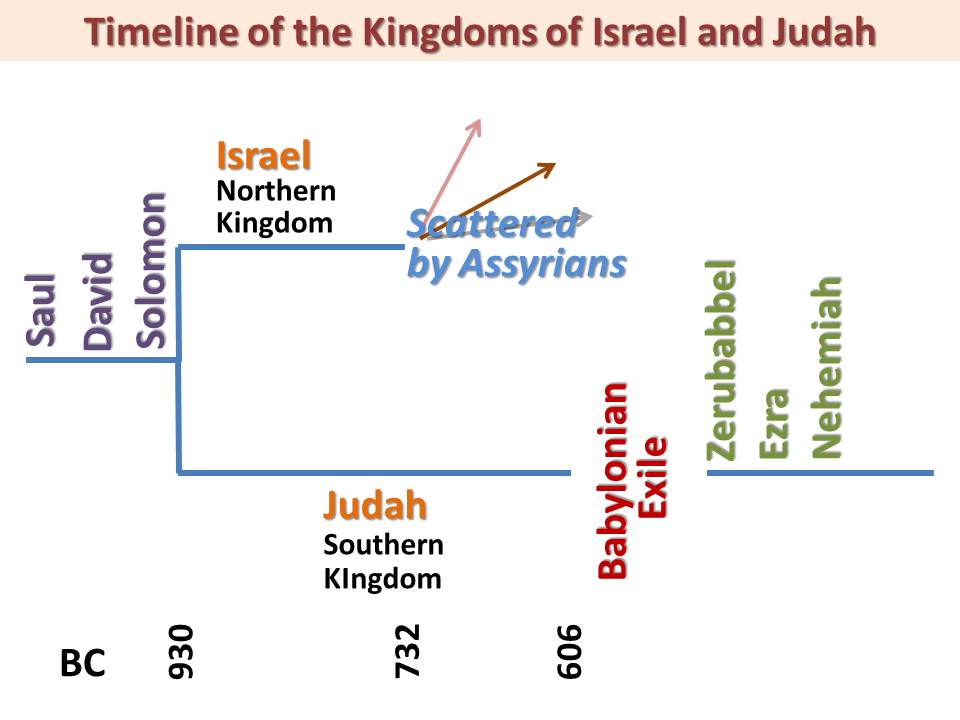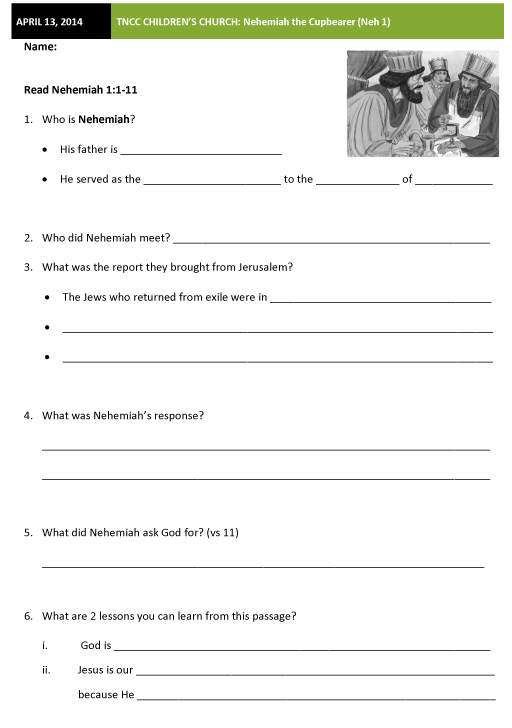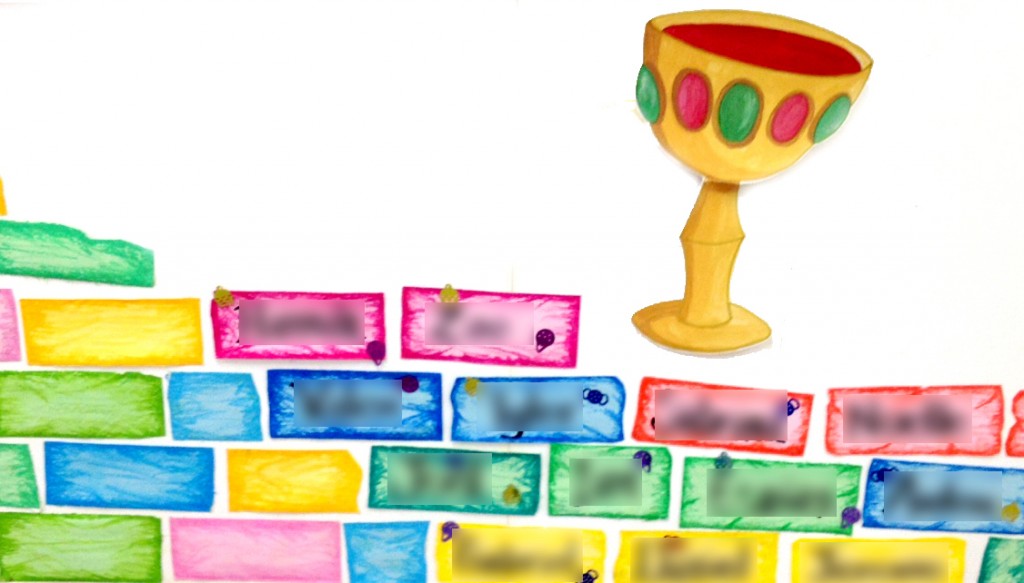Nehemiah the Cupbearer (Neh 1)
1. HOOK
- Play a fun, simple cup-themed icebreaker, e.g.
Cup Relay: Kids have to run to and fro 2 buckets, carrying a cup of water from one to another. First team to finish wins.
Cup Stack
2. STORY
- We’ve just finished a series on Jesus’ encounters, parables and miracles in the Book of Luke.
- This week onwards, we’re looking at an Old Testament book of the Bible, named after a very short man … he’s only “knee-high” (Ne-hi-miah) J

- (for older kids)
Briefly go through timeline of the Kingdoms of Israel and Judah to show where Nehemiah fits in.- Last year we learned about the kings of Israel — starting from King Saul, to David and Solomon. Then because Solomon worshipped all the other false gods, when his son Rehoboam took over, the kingdom was split into 2 — Israel (Northern; 10 tribes) and Judah (Southern; 2 tribes)
- Israel had many bad kings and kept sinning against God. In the end, the 10 tribes were attacked and scattered by the Assyrians.
- Judah had some good kings, but also many bad kings. In the end, they were attacked by the Babylonians and taken into exile (prisoners in a foreign land).
- In the years that passed, God raised up godly leaders to bring his people back to Jerusalem and to rebuild it. E.g. Zerubabbel led the first group of exiles to Jerusalem and rebuilt the temple.
- Another of those leaders was Nehemiah.
- Nehemiah was a Jew in a foreign land. But he was given a very important position — he was the Persian king’s cupbearer!
- What’s a cupbearer? (can illustrate with a cup of Ribena)
A high-ranking officer in royal courts, whose duty it was to serve the drinks at the royal table. On account of the constant fear of plots and intrigues, a person must be regarded as thoroughly trustworthy to hold this position. He must guard against poison in the king’s cup, and was sometimes required to swallow some of the wine before serving it. His confidential relations with the king often gave him a position of great influence.
- What’s a cupbearer? (can illustrate with a cup of Ribena)
- Many of Nehemiah’s friends had gone back to Jerusalem with Zerubabbel. One day, some of them, including Nehemiah’s brother Hanani, came to visit.
- Nehemiah was very keen to know how everyone was back in Jerusalem. But the report he received was not very good:
- Those who returned were in great trouble and disgrace
- The wall of Jerusalem was broken down
- The gates had been burned with fire
- Imagine you are studying or staying overseas, and you hear this sort of report from home — that your family is in trouble, their house is broken and their gates have been burnt. How would you feel?
- A city without walls! In those days, walls were a city’s main protection against its enemies. Remember the wall around Jericho that Joshua and the Israelites had to march around? Have you seen the Great Wall of China? They help to keep enemies out and the city’s people safe. A city without walls would be vulnerable to attacks and easily taken over. So it was a big deal that the grand city of Jerusalem did not have proper walls.
- Nehemiah was very sad. He sat down and cried. He mourned and fasted and prayed.
- In his prayer, he remembered who God was:
- A great and awesome God
- A God of Covenant of Love
- A God who hears His people’s prayers
- Nehemiah knew that God was a Promise-keeping God who keeps His covenant of love (Neh 1:5). Under the Old Covenant, God’s covenant was conditional, e.g. “with those who love him and keep his commandments.” Under the New Covenant, we receive His unconditional blessings because of Jesus, and, in response, we love Him and keep His commandments.
- He ended his prayer by asking God: “Give your servant success today by granting him favor in the presence of this man.”
- Who’s “this man”? The king of Persia
- Nehemiah knew that if he wanted to do anything about the situation, he’d need the favour and blessings of the king.
- Nehemiah also knew that God had placed him in an influential position as cupbearer.
3. LESSON
- God is faithful and gracious
- God had punished the Jews by exile to Babylon due to their repeated sins … yet by His grace, He brought them back to Jerusalem again.
- God never forgot His people, despite their disobedience. He used pagan kings and various leaders, such as Nehemiah, to effect His plans and purposes — to bring back the people, to rebuild the temple and walls, and to re-impart the Word to them.
- He raised Nehemiah, a captive, up to a position of importance and influence — the 3rd most important man in Persia, with direct access to the king — for this very purpose.
- Nehemiah was a shadow of Jesus
- Nehemiah was willing to take poison on behalf of the king.
- Jesus is our Cupbearer: Jesus took the Cup of Punishment and Suffering on behalf of us (Matt 26:39)
4. ACTIVITY SUGGESTIONS
- Worksheet






